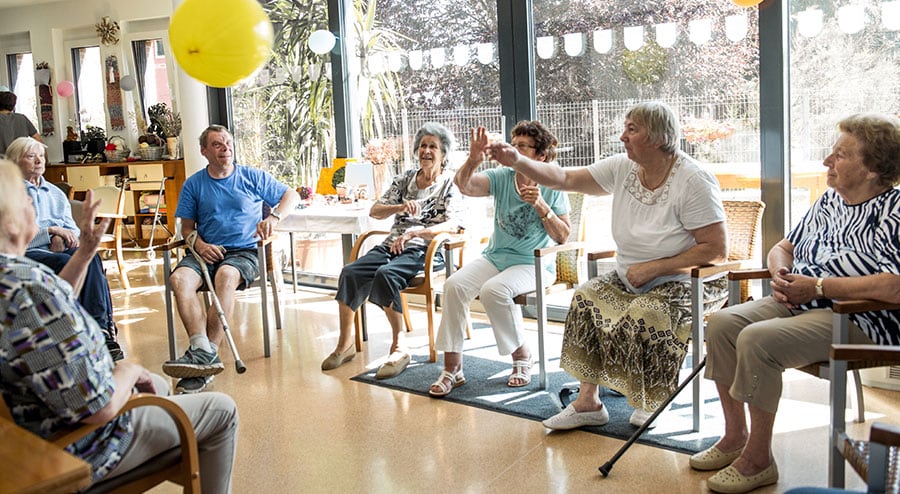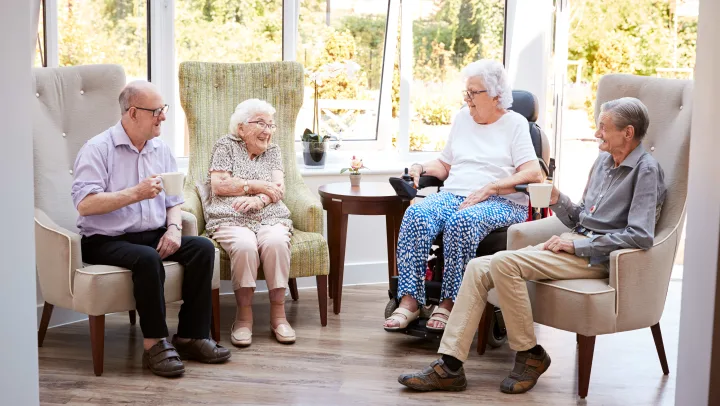Comprehending How Assisted Living Sustains Individuals With Dementia Treatment Demands
Helped living centers are increasingly recognized for their crucial duty in resolving the complicated care needs of patients with mental deterioration. By providing an organized yet nurturing atmosphere, these facilities not just promote safety and well-being yet likewise foster a sense of freedom through individualized treatment plans.
Overview of Mental Deterioration Care
Dementia treatment is increasingly crucial as the frequency of dementia-related problems climbs amongst aging populaces. This growing demographic trend demands a thorough understanding of dementia and the numerous approaches to care. Dementia includes a range of cognitive problems that conflict with life, influencing memory, reasoning, and interaction abilities. The problem can vary dramatically in its discussion, requiring customized care methods to satisfy individual requirements.
Efficient dementia treatment entails a multidisciplinary approach, incorporating clinical, psychological, and social support. Health care experts, caretakers, and relative must collaborate to produce a nurturing environment that promotes the well-being of individuals with mental deterioration. Key components of mental deterioration treatment consist of individualized treatment strategies, cognitive excitement treatments, and behavior treatments targeted at enhancing quality of life.
In addition, it is vital to recognize the psychological and emotional obstacles dealt with by both people and caregivers. Education and training for caregivers play a pivotal role in promoting understanding and compassion, therefore boosting interactions with those influenced by mental deterioration. As the need for dementia care proceeds to rise, the emphasis should remain on supplying caring, person-centered care that respects the self-respect and preferences of individuals dealing with this condition.
(Assisted Living Charlotte)
Function of Assisted Living Facilities
Helped living centers play an essential function in providing take care of individuals with dementia, supplying a supportive atmosphere that stabilizes independence with the necessary aid. These facilities are designed to cater to the distinct needs of residents, advertising a feeling of community while ensuring safety and health.
In an assisted living setup, qualified employee offer 24/7 assistance, aiding with day-to-day activities such as showering, clothing, and drug monitoring. This degree of care is important for individuals with dementia, that might deal with these jobs as a result of cognitive decrease. In addition, centers often include memory-enhancing programs and social tasks customized to stimulate cognitive performance and urge social interaction.
The physical atmosphere of nursing home is likewise optimized for safety and security, including secure entrances, well-lit pathways, and clear signs to assist citizens browse their surroundings. Furthermore, these neighborhoods foster a feeling of belonging, reducing the feelings of isolation that people with mental deterioration may experience.
Personalized Treatment Plans
To guarantee that each resident obtains the most appropriate care, individualized care strategies are necessary in nursing home for individuals with dementia. These strategies are customized to meet the distinct needs, preferences, and obstacles dealt with by each local, promoting their dignity and lifestyle.
The advancement of an individualized treatment strategy typically starts with a comprehensive assessment performed by healthcare specialists. Assisted Living. This assessment assesses the individual's cognitive abilities, physical health and wellness, emotional wellness, and social choices. Input from relative and the resident themselves is crucial, as it offers valuable understandings into their history, regimens, and personal passions
As soon as the assessment is full, a multidisciplinary team works together to create a treatment plan that lays out certain goals and interventions. This may include medication monitoring, daily living assistance, and behavior strategies tailored to minimize stress and click this site anxiety or frustration.
Regular evaluations and updates to the care plan guarantee it continues to be appropriate as the person's condition evolves. Memory Care. By focusing on customized care, aided living facilities can enhance the general well-being of residents with mental deterioration, cultivating an atmosphere that values their individuality while resolving their treatment needs efficiently
Engaging Activities and Socialization
Involving activities and socialization play a vital role in boosting the quality of life for residents with dementia in nursing home. These tasks are developed to promote cognitive feature, advertise emotional well-being, and foster links amongst homeowners. Organized programs, such as art therapy, music sessions, and reminiscence therapy, give opportunities for individuals to express themselves artistically while also setting off favorable memories.
Socialization is equally vital, as it battles feelings of isolation and solitude that can come with mental deterioration. Group activities, including video games, group outings, and common eating, urge communication and help residents build encouraging relationships with peers and caretakers. This feeling of community not only enriches their day-to-day experiences however also adds to a much more stable emotional environment.
Additionally, engaging tasks can be tailored to private preferences and cognitive levels, making certain that each citizen can participate meaningfully. By developing a setting that prioritizes engagement and social communication, aided living centers can considerably improve homeowners' total psychological health and wellness, promoting a feeling of purpose and belonging. Eventually, these initiatives are vital parts of detailed mental deterioration care, substantially impacting homeowners' general wellness and joy.
Advantages of Community Assistance

Additionally, community support promotes social interaction, which is vital for cognitive and emotional health and wellness. Engaging with peers and joining group tasks can boost mood and encourage reminiscence, contributing to a higher feeling of belonging. This social engagement is necessary, as loneliness and seclusion can intensify cognitive decrease.

(Dementia Care Charlotte)
Verdict
To conclude, assisted living centers serve as important environments for individuals with mental deterioration, offering organized assistance that cultivates both self-reliance and security. The implementation of customized treatment strategies ensures that each local's one-of-a-kind requirements are fulfilled, while engaging tasks advertise social communication and cognitive involvement. The sense of community within these facilities substantially minimizes sensations of seclusion, enhancing total psychological wellness. Thus, assisted living plays a necessary duty in enhancing the lifestyle for clients with mental deterioration.